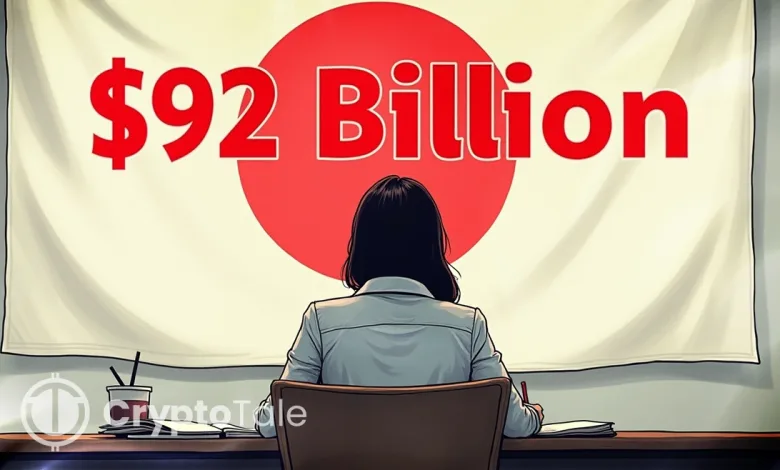Takaichi Rolls Out Massive Plan to Fight Rising Prices

- Japan introduces a $92 billion plan to ease inflation and boost household stability.
- Arthur Hayes warns the policy may drive yen weakness and encourage Bitcoin gains.
- Economists say Japan faces a test of balancing relief with long-term fiscal stability.
Japanese Prime Minister Sanae Takaichi has unveiled a ¥13.9 trillion ($92.19 billion) economic package to tackle rising inflation and protect household purchasing power. The newly appointed premier, Japan’s first female leader, said the plan will ease the burden on companies and families struggling with energy and food costs. The initiative, her first major policy move since taking office, signals her commitment to what she calls “responsible proactive fiscal policy.”
Massive Economic Relief and Fiscal Measures
The new program will give money directly to families and small companies by way of subsidies and grants. The package contains, among other things, assistance with electricity and gas bills, regional financial help to reduce price pressures, and incentives for SMEs to raise salaries and boost investment.
Bloomberg reports that the plan also allocates significant funds to key sectors such as defense, technology, and energy. The investments are in line with Tokyo’s trade commitments under a recent partnership with Washington, thus reflecting Japan’s policy of reinforcing both economic security and industrial innovation at the same time.
The initiative will rest on three pillars: inflation countermeasures, investment in growth industries, and enhanced national security. Among its relief priorities, the government plans to abolish the provisional gasoline tax rate. While the size of additional bond issuance remains uncertain, Takaichi has directed the preparation of a supplementary budget to finance the plan.
Japan’s Nikkei 225 Index reversed earlier losses and traded higher after the announcement, while the yen pared morning gains. Investors continue to monitor spending plans closely, as Japan remains one of the world’s most indebted economies.
Arthur Hayes’ Criticism and Currency Implications
Arthur Hayes, co-founder of BitMEX, sharply criticized the move, describing it as another round of “money printing” disguised as fiscal relief. In a post on X, Hayes remarked, “Let’s print money to hand out to folks to help with food and energy costs.” He argued that such inflation stems from prior excessive money creation.
Hayes warned that Japan’s policies could further weaken the yen, suggesting a possible slide to ¥200 per dollar while projecting Bitcoin’s rise to $1 million. His remarks have sparked debate among macro analysts who question whether large-scale stimulus can coexist with currency stability in a debt-heavy economy like Japan’s.
Related: Japan Moves to Ban Crypto Insider Trading Under New Rules
Coordination with the Bank of Japan and Economic Outlook
Takaichi is pursuing closer coordination with the Bank of Japan (BOJ) to ensure fiscal and monetary policies move in tandem. At a recent press conference, she stated that the goal is inflation “driven not just by cost-push factors but accompanied by wage gains.” The BOJ faces a delicate task. Raising interest rates too rapidly could undermine fiscal relief efforts, while prolonged easing risks deeper yen depreciation.
Economists note that Japan’s inflation remains moderate compared to peers but persistent without matching wage growth. The government aims to slow the decline in consumer spending and maintain employment stability. However, experts caution that financing additional support through new borrowing could further undermine fiscal sustainability and weaken investor confidence.
Takaichi’s initiative represents a bold effort to strike the right balance between support, reform, and resilience. In the months ahead, her administration faces the challenge of driving sustainable growth without triggering inflation or renewed fiscal strain.




